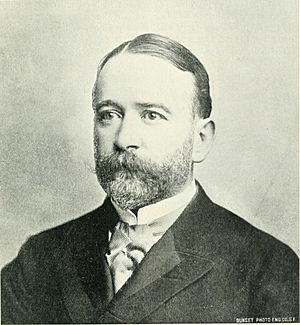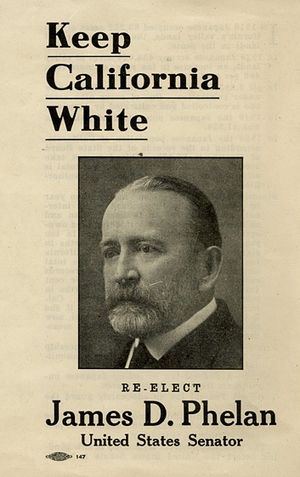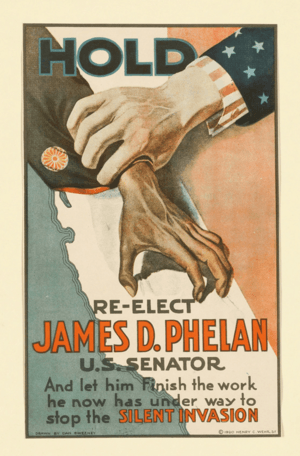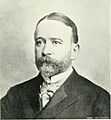James D. Phelan facts for kids
Quick facts for kids
James D. Phelan
|
|
|---|---|
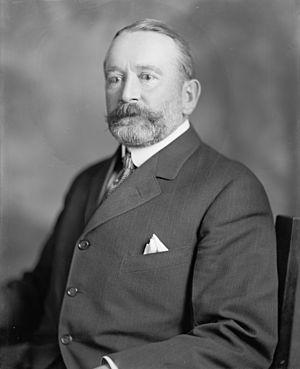 |
|
| United States Senator from California |
|
| In office March 4, 1915 – March 4, 1921 |
|
| Preceded by | George Clement Perkins |
| Succeeded by | Samuel M. Shortridge |
| 25th Mayor of San Francisco | |
| In office January 4, 1897 – January 7, 1902 |
|
| Preceded by | Adolph Sutro |
| Succeeded by | Eugene Schmitz |
| Personal details | |
| Born | April 20, 1861 San Francisco, California, U.S. |
| Died | August 7, 1930 (aged 69) Saratoga, California, U.S. |
| Political party | Democratic |
| Spouse | Unmarried |
| Alma mater | St. Ignatius College University of California-Berkeley |
| Profession | Politician |
James Duval Phelan (born April 20, 1861 – died August 7, 1930) was an important American politician, community leader, and banker. He served as the Mayor of San Francisco from 1897 to 1902. Later, he represented California in the United States Senate from 1915 to 1921. Phelan was also known for his strong views on immigration, supporting laws that limited people from certain Asian countries from entering the U.S.
Contents
Early Life and Family
James D. Phelan was born in San Francisco. His father, James Phelan, was an Irish immigrant who became very rich during the California Gold Rush. He made his fortune as a trader, merchant, banker, and real estate investor.
Phelan's father started the First National Gold Bank, which was the first national bank in California. He also helped create a company to dredge the Panama Canal. In 1889, he founded the Mutual Savings Bank of San Francisco. James D. Phelan grew up in a wealthy family and later joined his father's businesses.
Phelan's mother, Alice Kelly, came from an old Irish noble family. She moved to New York, where she met James Phelan. They later moved west, where his father built his large fortune. James D. Phelan graduated from St. Ignatius College in 1881.
Political Career and Views
After studying law at the University of California, Berkeley, James D. Phelan became a banker. He then entered politics and was elected Mayor of San Francisco. He served three two-year terms from 1897 to 1902. As mayor, he worked to reform the city's government and helped create the League of California Cities.
In 1914, Phelan was elected as a United States Senator for California. He served from 1915 to 1921. During his time in the Senate, Phelan became a leading voice for limiting immigration from Japan. He also supported laws to exclude Chinese immigrants from the United States. He wrote an article called "Why the Chinese Should Be Excluded" in 1901. In this article, he argued that Chinese immigrants could not fit into American society. These views are now widely seen as unfair and discriminatory.
Water and Land for San Francisco
In the early 1900s, Phelan bought land and water rights around the San Francisco Bay Area. He gained rights to the water from the Tuolumne River in Hetch Hetchy Valley. He wanted to use this water to provide public water and electricity for a larger area he called "Greater San Francisco."
President Theodore Roosevelt supported using the Hetch Hetchy area for San Francisco's development. Phelan also worked with his friends from the Bohemian Club to add more land around San Francisco Bay to the city.
The San Francisco Plague
During Phelan's time as mayor, San Francisco faced a serious health crisis: the plague of 1900–1904. This outbreak mainly affected the city's Chinatown community.
Initially, Phelan spoke about the need for better public health and more funding for health departments. However, his administration later reduced funding for the city's health department. This left the city unprepared for the plague.
When the plague spread, federal officials tried to stop travel to prevent it from spreading further. Mayor Phelan blamed a court ruling that limited the city's power to deal with the plague. He also said the city did not have enough money to help fight the disease. News reports at the time sometimes unfairly blamed certain communities and used offensive images.
Helping After the Earthquake
After the devastating 1906 San Francisco earthquake, Phelan played a key role in recovery efforts. He was part of the Committee of Fifty, a group formed to manage the crisis.
He helped handle money from the American Red Cross to ensure it was used properly for relief efforts. Phelan became the Chairman of the Board of Directors for the San Francisco Relief and Red Cross Funds.
Time in the U.S. Senate
As a Democrat, Phelan was elected to the United States Senate in 1914. He served from March 4, 1915, to March 3, 1921.
During World War I, when the U.S. was allied with Japan, Phelan spoke less about his anti-Japanese views. However, in 1919, he again spoke out against what he called the "Yellow Peril" and supported limiting Japanese immigration.
He ran for reelection in 1920 but lost. His campaign used slogans like "Keep California White," which caused controversy. This poster is now displayed at the Japanese American National Museum. In the Senate, he led committees on railroads and irrigation.
Later Life and Legacy
After leaving the Senate, Phelan returned to banking and collecting art. He continued to be involved in efforts to limit Japanese immigration. He helped pass the Immigration Act of 1924, which banned Japanese immigrants from entering the country.
Phelan died in 1930 at his country estate, Villa Montalvo, in Saratoga. He is buried in the family mausoleum in Holy Cross Cemetery in Colma, California.
After his death, Villa Montalvo was given to the people of Santa Clara County. It is now a center for arts. The Phelan Building in San Francisco, built in 1908, is named after him.
Some places originally named after him have been changed due to his controversial views. Phelan Avenue at the City College of San Francisco was renamed Frida Kahlo Way in 2018. A dorm at the University of San Francisco called Phelan Hall was also renamed in 2017 after student protests.
The small town of Phelan in the Californian High Desert is named after him. The James D. Phelan awards are given to young California writers and artists, as he wished in his will.
Phelan's legacy is complex. While he contributed to San Francisco's growth, his strong views against certain immigrant groups are now seen as discriminatory. His campaign slogan "Keep California White" highlights these views. A bust statue of him is in San Francisco City Hall, but many now question if it should remain there.
Images for kids
 | Kyle Baker |
 | Joseph Yoakum |
 | Laura Wheeler Waring |
 | Henry Ossawa Tanner |


